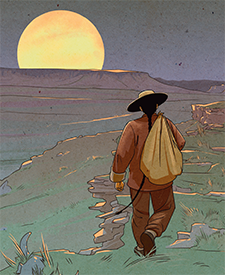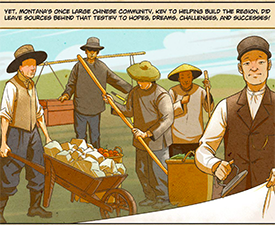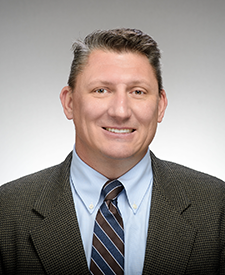THE LEPAGE GRANT PROGRAM
The Lepage Center provides educational resources and funding toward historical scholarship, methods and inquiry in the public interest.
Grant Program
The Lepage Center annually sponsors grant funding for institutions and individuals pursuing historical projects in the public interest. The Center welcomes a wide range of original, diverse, and imaginative applications. Past examples of funded projects include blog posts, podcasts, multimedia exhibits, oral history projects, op-eds, a mapping project, crowdsourced syllabi, educational workshops, and more.

Illustration by Rich Lee.
Grantee Spotlight: “Climbing Gold Mountain”
In “Climbing Gold Mountain,” a graphic novel by Mark T. Johnson, a Mountain West history comes to life
During the 19th century, a trailblazing generation of migrants flocked from southern China to Montana in pursuit of the chance to strike gold.
For some, the dream led to the big sky state’s precious metal mines. Most found themselves working in their town’s laundromat, cooking in restaurants or constructing the state’s railways, which forged a critical connection to the rest of America’s burgeoning West Coast. At its peak in 1890, around 2,500 Chinese people lived across the state, making up roughly 10% of its non-Native community.
Fifteen years ago, historian Mark T. Johnson paid a visit to the Montana Historical Society’s archives to learn more. He was fresh off a plane from Shanghai, where he worked as a history teacher at an international school. “Most of the students were Asian or Asian American kids that had been tossed about the global economic markets,” Johnson recalled. “I wanted to teach them American history in a way that spoke to their experience and shared my home region of the Rocky Mountains with them.”
At first, the Society’s archivist came up empty handed. Then, “like the Ark of the covenant from Raiders of the Lost Ark,” two boxes of letters emerged. Their contents were written entirely in traditional Chinese—a more complicated system of characters than current scripts used since the 1950s. “My 27 million neighbors in Shanghai could only read about 30% of these letters,” he explained. “Thankfully, I was teaching at a wonderfully diverse international school with families from [China], Taiwan and Hong Kong.”
With the help of students and their families, together they translated an intimate portrait of Montana's historic Chinese community for the first time.
The correspondences inspired Johnson’s first book, “The Middle Kingdom Under the Big Sky.” Now, with support from Villanova University’s Albert Lepage Center for History in the Public Interest, he’s bringing the stories to a new medium in Climbing Gold Mountain, a graphic novel illustrated by Bay Area artist Rich Lee.
“With some of the stories that I told in [my] first book, I could close my eyes and almost see them as a movie script,” Johnson said. “And it was important to have an Asian American artist tell these stories with visual sensitivity, with cultural understanding.”

Illustration by Rich Lee.
The book’s six chapters share stories from the rise and peak of Montana’s Chinese community; the 1870 lynching of a migrant; a tense standoff between white and Chinese forestry workers; a mother sending two young sons overseas; a monumental civil rights case against an anti-Chinese boycott; the glow of a Lunar New Year far from home.
“We look at what was going on in southern China that was causing people to emigrate and the pull factors here in North America,” Johnson explained. Most of Montana’s migrants hailed from the Guangdong providence of southern China, where in the 19th century, a combination of pandemics, famine, natural disasters and war posed grave threat across the region.
While Johnson blocked out comic frames and wrote dialogue, Rich Lee worked to transform archival portraits of Chinese migrants into living, breathing characters.
"The historical photos I like most are candid shots,” Lee added. “You see [subjects] in their true environment. They're not dressed up; they're not stiff and polished. I always look at the background, the kind of tools they had, the bottom of their shoes, their torn sleeves ... you see the lines on the faces and how hard their lives were.”
The Albert Lepage Center will fund a portion of the book’s visuals that remain in development. For Lee, recreating scenes from the past poses a unique artistic opportunity: While the graphic novel genre might first conjure images of superheroes and sci-fi monsters, in Climbing Gold Mountain, Johnson and Lee use creative liberty to immerse readers in migrants’ often-overlooked realities.
"The colors are not going to be as saturated as, say, an X-Men comic,” he explained. Starkly different visuals of winter came to mind, where cool whites, blues and muddy browns dominate scenes of long hours laboring in harsh outdoor conditions. “The only chapters that had saturated colors were maybe a page, or a splash when things got violent.”

Mark T. Johnson
The novel is geared toward middle and high school readers, who in many cases are learning about the key role of Chinese people in Montana’s history for the first time.
“I don't think you need to look too far into the headlines to realize that there are people who are struggling to try and achieve their dreams against great obstacles,” Johnson said.
“Sometimes it's hard for students to look into the present and engage without getting too emotional or politicized. But when we can see people from the past who made similar choices under similar pressures, I think it can give us more empathy and understanding in the present ... and it's been just a joy to uncover these stories and share them with the world.”
Read more about our latest Lepage Center Grant recipients below.
Educational Resources
The Lepage Center hosts a variety of free educational events covering diverse historical topics, characters, and eras. We often record our programming for later free viewing. View our events page for more information.
